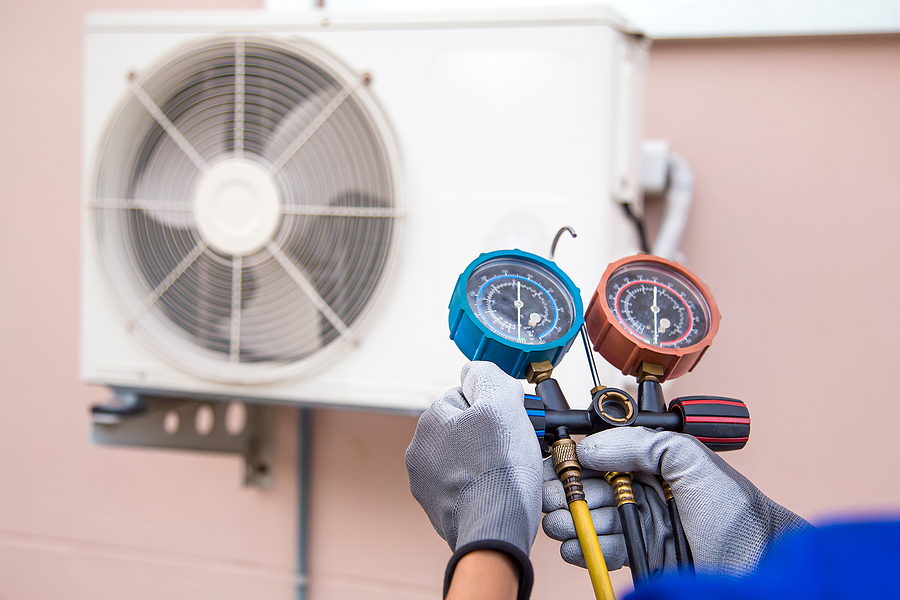EnergySage estimates that electricity bills average around $250 per month in Florida. This is just an average. Households with homes that aren’t well insulated, have older AC units, or have large homes with many windows can find their bills are much more expensive.
When your bills are skyrocketing, it’s time to address the best ways to lower your electricity usage. As central AC consumes a lot of electricity, take time to learn more about the best ways to reduce your air conditioner’s energy usage.
Schedule a Comprehensive AC System Evaluation
Have you had your AC system inspected lately? If it’s been years, or you’ve never considered it, it’s time to schedule one. During that inspection, the professional technician will let you know if your system needs cleaning or if any parts are not functioning properly. You’ll gain an expert’s opinion on what you could do to extend your current system’s life and boost its efficiency.
Most of the time, boosting your system’s efficiency can be as simple as having your ducts and AC system cleaned. Cleaning the coils of dust and grime makes a huge difference in having an efficient system. If there are holes or cracks in your ducts, addressing those issues will also boost efficiency and save money.
Make Sure Your AC System Isn’t Oversized or Undersized
The other reason to book a system evaluation is that some systems are improperly sized. If a homeowner installed a DIY AC system, this is a common problem. When a central AC system is oversized or undersized, it will not work efficiently.
An undersized system will struggle to cool the home to the thermostat’s setting, so it runs constantly, thus using more electricity. An oversized system turns on and off frequently as it cools the room quickly, and that wears out components and requires the motor to turn on and off rapidly.
A professional AC installer carefully calculates what size is optimal. The installer will look at the size of your home, the number of rooms that need to be cooled, how high your ceilings are, and how many windows you have. Wall, attic, and ceiling insulation are other considerations. An airtight home will not have the drafts and heat loss that an older home with poor insulation has. Open layouts may take more time to cool than an older home with closed-off rooms.
Clean Your Air Intakes and Register Cover
Your AC system draws air from the room to condition it. It also releases cool air through vents into your room. These vents are often on the wall, ceiling, or sometimes on your floor. Make sure you keep these covers and vents clean of pet hair, dust, and crumbs. Use a vacuum with an upholstery brush to clean them off.
It’s also important to clean them off because air intake may draw some of this dust, crumbs, hair, and other contaminants into the ducts. All of that grime can build up and impact airflow to and from your rooms and outside AC unit.
Tap Into Alternate Energy Sources
Have you considered offsetting your energy usage by purchasing solar panels? With Florida’s sunny weather, the solar power your panels generate can slash your electricity bills. If you’ve ever thought of taking this step, it’s a great time.
Until December 31, 2023, renewable energy tax credits of 22% are available for homeowners who add biomass fuel stoves, fuel cells, geothermal heat pumps, small wind turbines, or solar energy systems. You’ll have to pay for the system, but the tax credit and savings on your electricity bills offer a quick return on your investment. Claim your tax credit by filing out Form 5695 with your tax return.
Save Money by Upgrading to an Energy-Efficient AC Unit
The average central air system is only going to last around 15 to 20 years. If yours is that old, you’ll save a lot of money by upgrading to a new, ENERGY STAR central AC system. According to the U.S. Department of Energy, You can save as much as 40% when you upgrade to an efficient AC system.
The energy efficiency ratio (EER) and seasonal energy efficiency ratio (SEER) rating on an air conditioner show how efficient a model is. The higher the efficiency, the more you save in operating costs. Here’s a quick breakdown of what these ratings mean.
SEER is a measurement of a unit’s efficiency over an entire cooling season. An AC unit is tested to see how much it costs to operate it at a range of outdoor temperatures between 65º F and 104º F.
EER is similar but it’s more specific and only measures the efficiency when the outdoor temperature is 95º F. It’s based on dividing the maximum BTUs by the maximum cooling wattage at 95º F, while SEER uses that same formula with several different outside temperatures.
For an AC system to qualify as an ENERGY STAR product, you’re usually looking at a SEER rating of 15 or greater and an EER rating of 12 or greater. It does depend on the BTUs and whether it’s a single package or split system. ENERGY STAR products often qualify for rebates and tax incentives that lower the cost you’ll pay on AC installation.
Talk to an Expert to Learn More About the Current Rebates and Incentives
When you choose a licensed Florida AC installer like All Year Cooling, you gain expertise that ensures you have a properly-sized system design and professional installation. You also have an expert to guide you through current Florida AC rebates and tax incentives.
Purchase your new central AC from All Year Cooling and ask about our 10-year extended warranty that’s available with new AC systems. The peace of mind that comes with a comprehensive parts and service warranty is unbeatable. Reach us online through live chat, by phone, or by email.


 Duct Sanitization
Duct Sanitization UV Light Installation
UV Light Installation Sustainability
Sustainability Veteran’s
Veteran’s